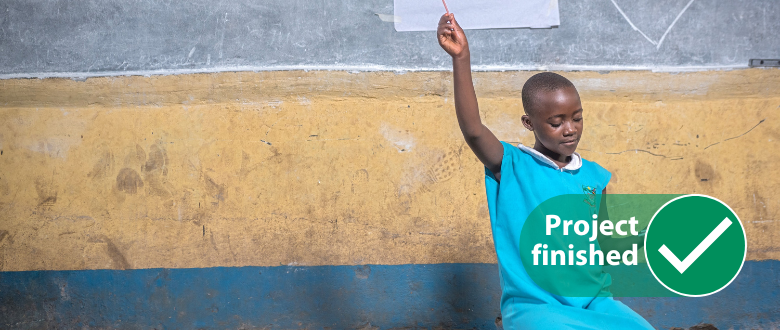
Uganda is one of the largest refugee-hosting nations in the world, hosting 1.55 million refugees and asylum seekers. Its refugee policy is justifiably regarded as one of the world’s most generous and progressive. Among other things, refugees have free access to the national education system. This model of integrated education provision has fostered amicable relations between refugee learners and their peers from the host population. However, its delivery also poses important challenges for educators at the frontline of implementation.
School closures and other COVID-19 restrictions have worsened an already profound learning crisis. Uwezo’s 2021 learning assessment found out that in Isingiro only 26% of P3-P7 learners are able to read and comprehend a P2 story and solve P2 division tasks.
The situation has taken a toll on learners’ mental health and wellbeing as well, leaving overage-for-grade learners particularly vulnerable. While they struggle to catch up with basic math and reading, they also need to bounce back from a period marked by stressful family situations, considerable financial pressures and exacerbated feelings of fear, loneliness and anxiety.
With the reopening of primary schools in January 2022, a holistic approach to education is crucial, focusing on essential learning outcomes such as foundational literacy and numeracy, as well as social-emotional learning.
Overage-for-grade primary level-learners (P3 – P5) have better chances of a sustained return to school thanks to improved literacy, numeracy and social-emotional skills.
- Uganda Ministry of Education and Sports
- Adjumani District Local Government
- National Curriculum Development Centre
- Harvard EASEL Lab
- TaRL Africa
- Innovations for Poverty Action
The TaRL(+) @ PLAY-project is built on three pillars that have been piloted in 28 schools:
- Application of the Teaching at the Right Level Methodology. Overage-for-grade primary learners in P3, P4 and P5 are:
- regularly assessed to identify their learning levels for foundational literacy and numeracy;
- grouped according to their learning levels rather than their age;
- and taught through concrete, captivating, connected, challenging, collaborative, creative and cheerful (“7Cs of learning through play”) reading and mathematics activities adapted to their level.
- Contextualisation and focused application of SEL Kernels developed by the Harvard EASEL Lab. In their TaRL groups, the learners of 12 schools are also:
- engaged in age-appropriate flexible, bite-sized games, routines, discussions and other instructional methods that cultivate their social emotional learning (SEL);
- regularly assessed for SEL
- Subject-oriented professional development of instructors and mentors that:
- includes teaching practice, regular follow-up and focused feedback;
- provides well-structured teaching and learning support materials;
- and fosters both competence and wellbeing.
The first two pillars focus on rapid improvement of foundational literacy, numeracy and social-emotional skills in overage-for-grade primary level-learners (P3-P5). The third pillar focuses on strengthening the competences and wellbeing of the frontline implementers of the TaRL(+) @ PLAY-project.
Achievements of the project:
- Across all three subject areas (numeracy, English literacy & local language literacy), statistically significant improvements in learners moving from lower to higher levels between baseline and endline were recorded.
-
Although SEL skills were not directly measured, behavioural changes reported by teachers suggested development, such as increased participation and improved self-esteem among over-age-for-grade learners.
-
Capacity building for 125 government primary school teachers in TaRL/TaRL+ implementation was successful, with high satisfaction rates and confidence levels among trained teachers. The mentor observations also showed that teachers effectively implemented TaRL/ TaRL+ in their classrooms.
- TaRL/TarL+ Teaching and Learning Support Materials (TLSM) were developed and utilised effectively by teachers, with 98% incorporating them into lessons.
-
Teachers received weekly SMS messages for motivation and practical guidance, contributing to the proficient adoption of TaRL techniques in class. The lesson observation data of 55 TaRL and 38 TaRL+ teachers from 14 TaRL and 12 TaRL+ schools during the project implementation showed that the average score across all three domains (session planning, TaRL delivery, and playful learning) was high, meaning that most teachers proficiently adopted TaRL techniques in class. Similarly, lesson observation data showed that TaRL+ teachers competently implemented SEL Boosters in combination with TaRL.
TaRL(+) @ PLAY is part of the LEGO Foundation’s Playful Learning in Crisis Settings initiative.




